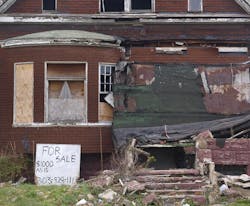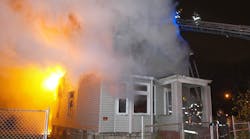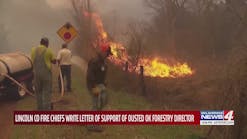Thirty years ago, hundreds of fire buffs from around the country made an annual pilgrimage to Detroit to witness the fiery day before Halloween named "Devils’ Night." It peaked in 1984 when more than 800 fires were set and followed with between 500 to 800 fires in the days and nights before Halloween in a typical year. Buffs would book rooms in downtown hotels that overlooked the city, and sit by windows, ears glued to radio scanners and watch the city go up in flames.
Fast forward to "Angels’ Night" (the official name was changed in 1995), where you can see the effects of the declining population of the city, the efforts of patrolling volunteers and the cold, rainy tailings of Hurricane Sandy. This year, officials say the city saw the fewest number of fires in 17 years, only 93, or about 31 per day during the three-day period.
Officials broke down the numbers to include 39 fires in occupied buildings, 20 in vacant buildings and four garages. Not included were the numerous responses to reports of downed wires, heightened by high winds and a crumbling infrastructure.
While practically any other city in the country would be horrified if that number of fires occurred in their city, Detroiters are proud of the fact there were so few.
On the other hand, 31 fires a day is about average for Detroit, prompting the Detroit Firefighters Union president to remark, "To us, every night is Devil’s Night."
The city enlists a corps of volunteers to patrol the streets on the two days leading up to and on Halloween. Clad in orange t-shirts, sporting blinking yellow lights on their cars, they go forth, fueled with sponsor White Castle’s sliders, patrolling the streets and reporting any suspicious activity. In 1995, the city recruited around 50,000 volunteers. This year, they numbered around 5,000. There is no doubt they are effective as the fires on these days seem to occur after they go off-duty around 1 a.m.
The remnants of Hurricane Sandy helped, keeping temperatures low and showering theMotorCitywith intermittent rain and high winds the two days before Halloween. It seemed that the weather broke the spirit of the usually active arsonists.
They also literally ran out of gas. This year, the city passed an ordinance prohibiting residents from getting gas in portable containers until 12-AM on Halloween night.
In the firehouses, the firefighters were relieved that at least for a few nights, their heavy work load was eased a bit, but, there are other pressures that make them apprehensive.
On the ballot for Tuesday’s election are two initiatives that could materially affect the fire department here.
The first, Proposal 1, is a measure that keeps in place the state’s emergency financial manager law, which allows the state to step in and appoint a manager for failing municipalities and school districts that cannot manage their fiscal interests. Appointed by the governor, the managers can void existing contracts and remove elected leaders in an effort to straighten out financial difficulties.
If Detroit runs out of money, and the state needs to take over, an incoming emergency manager would certainly cause disruption of the status quo, which is why city officials are fighting for its defeat. If the measure is defeated, then there will be no emergency managers, and no extra money from Lansing, at least until the legislature comes up with another solution.
Proposal 2 is a measure that would put collective bargaining rights into state law and ban the state from enacting right-to-work-laws. Business people are putting up a strong fight to defeat the measure, while plenty of national labor organizations are battling to drum up support for its passage.
If it is defeated, and if Proposal 1 is enacted, this could mean drastic changes in the working rules and salaries of Detroit firefighters, already demoralized by mandatory wage cuts and closings of fire companies.
Fire company closings are problematic as well. While attempting to cut costs, the lack of coverage is reflected in workload increases on remaining units. One statement by Detroitfirefighters and officers that I heard over and over was that, "The fires seem to be getting bigger." The buildings are the same and arsons occur at the same rate, but could it be that companies having to travel longer distances to reach the scene are finding fires that have had a longer time to develop?
The decline in Devils’ Night (or Angels’ Night if you prefer) fires over the years is a good thing, but one can’t help to wonder if it reflects the decline in the city as a whole. City blocks without houses are everywhere and on almost every street, it’s rare that you cannot see a vacant building or two.
Meanwhile,Detroit firefighters come to work every day, facing rumors of more cutbacks and company closings, and depending on the election tomorrow, the possibility of not being able to do anything about it.
A cold, windy and damp Devils’ Night indeed.







